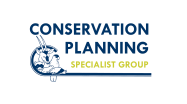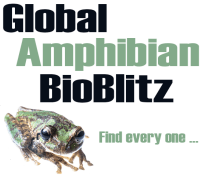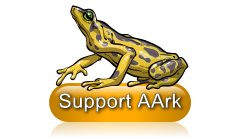Amphibian Veterinary Outreach Program
Many threatened amphibian species require conservation intervention of some sort, and those that cannot be saved in the wild in a timely manner require captive rescue. However, it is not enough to simply collect them, place them in glass boxes, and consider the job finished. Long-term health issues related to basic husbandry, nutrition, and disease will, if left unchecked, eventually cause the captive population to follow the wild one into extinction, wasting precious time and other resources in the process. Amphibian caretakers must be enabled with the skills to properly manage the species in their care from a health, veterinary and population management perspective.
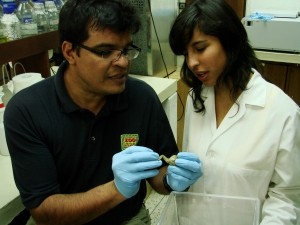 In late 2008, after visiting ex situ facilities in Latin America where problems were evident, an idea germinated to help range-country programs reach higher levels of success in their breeding programs through on-site training with experts in amphibian husbandry, veterinary work and population management. With support from the Turner Foundation, Nipmuc High School, and Amphibian Ark an Amphibian Veterinary Outreach Program (AVOP) was initiated in 2009. The AVOP team works with an overall objective to improve regional and local capacity for training, diagnostic and treatment. Specifically, this team consists of:
In late 2008, after visiting ex situ facilities in Latin America where problems were evident, an idea germinated to help range-country programs reach higher levels of success in their breeding programs through on-site training with experts in amphibian husbandry, veterinary work and population management. With support from the Turner Foundation, Nipmuc High School, and Amphibian Ark an Amphibian Veterinary Outreach Program (AVOP) was initiated in 2009. The AVOP team works with an overall objective to improve regional and local capacity for training, diagnostic and treatment. Specifically, this team consists of:
- Brad Wilson, DVM. A private clinical veterinarian from Atlanta, Georgia, Brad has been the consulting veterinarian for the Atlanta Botanical Garden since the mid-1990s and has worked on projects in Panama, Ecuador and also in Georgia. He is an Amphibian Ark Consulting Veterinarian and has been an instructor with AArk husbandry workshops around the world.
- Sam Rivera, DVM. Also a clinical veterinarian, Sam is based at Zoo Atlanta where he has been since 2005. Sam has a long teaching history and his clinical experience ranges from Giant Pandas to Galapagos Tortoises to extremely endangered Panamanian amphibians. Sam’s fluency in Spanish is a huge help in making sure our collaborators in Latin America fully comprehend the information provided.
- Allan Pessier, DVM is an amphibian pathologist in the Wildlife Disease Laboratory at the Institute of Conservation Research at the San Diego Zoo, where he has worked since 2003. Allan’s contributions to the field of identifying, diagnosing and treating amphibian chytrid fungus are recognized worldwide. He has trained many students around the world in the sampling, staining and diagnoses of amphibian ailments.
Initially, 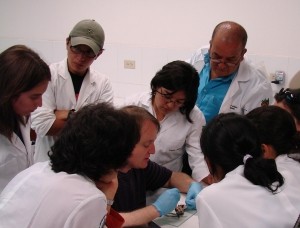 the services of AVOP were offered to facilities in Brazil, Panama, Ecuador and Colombia, however, funding limitations prevented this and it was decided to narrow the focus and budget in lieu of not doing anything at all. During 2008–2010, initial surveys and site visits were made to several facilities in Ecuador and Panama. During these visits, the team worked directly with local stakeholders including staff, students, and local veterinarians, demonstrating diagnostic, surgical and necropsy techniques. In some cases, histopathology samples were collected and prepared on site, followed by examination and evaluation of any treatment options.
the services of AVOP were offered to facilities in Brazil, Panama, Ecuador and Colombia, however, funding limitations prevented this and it was decided to narrow the focus and budget in lieu of not doing anything at all. During 2008–2010, initial surveys and site visits were made to several facilities in Ecuador and Panama. During these visits, the team worked directly with local stakeholders including staff, students, and local veterinarians, demonstrating diagnostic, surgical and necropsy techniques. In some cases, histopathology samples were collected and prepared on site, followed by examination and evaluation of any treatment options.
The AVOP team also helps to develop protocols for biosecurity, quarantine and other husbandry-related issues. Those visits identified health problems in these situations including metabolic bone disease, rhabditiform nematode infections (Rhabdias and Strongyloides), and infectious diseases such as chytridiomycosis. Many of these problems are related to nutrition and husbandry and have solutions that can be easily implemented if staff receive appropriate training.
There are now three active centers in Ecuador involved in maintaining assurance populations of endangered amphibians: The Balsa de los Sapos Center program at the Pontificia Universidad Católica del Ecuador (PUCE), the Jambatu Amphibian Conservation Center in Quito operated by Dr. Luis A. Coloma, and the Amaru Zoo’s Amphibian Conservation Center – Mazán. The AVOP program is helping all three of these facilities that are now collaborating within Ecuador to further the conservation of these unique and valuable species. In March 2011, the AVOP team spent a week working at PUCE in the Balsa de los Sapos Center. This is the very successful and well known facilty that was started many years ago by Professor Luis Coloma and is now headed by one of Dr. Coloma’s former students, Dr. Andres Merino-Viteri. Over the course of the past several years, the program has been home to populations of several critically endangered species from Ecuador. While success has been sweet for the Balsa, lingering health, nutrition and management issues have held the program back in some ways. The AVOP team made its first visit to the lab in January 2010 followed by another visit in September 2010 to work side by side with the Balsa staff in helping to isolate, diagnose and treat problems. We also visited the Amaru Zoo facility and the Jambatu Center where we observed great progress on their ex situ projects.
For additional information about the services provided by AArk’s Amphibian Veterinary Outreach Program, or to make inquiries about hosting a visit to your facilities, please contact AArk’s Training Officer.





